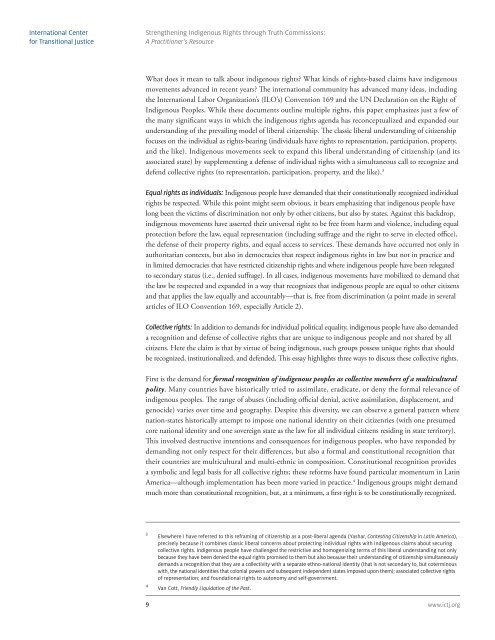Strengthening Indigenous Rights through Truth Commissions: A ...
Strengthening Indigenous Rights through Truth Commissions: A ...
Strengthening Indigenous Rights through Truth Commissions: A ...
- No tags were found...
Create successful ePaper yourself
Turn your PDF publications into a flip-book with our unique Google optimized e-Paper software.
International Centerfor Transitional Justice<strong>Strengthening</strong> <strong>Indigenous</strong> <strong>Rights</strong> <strong>through</strong> <strong>Truth</strong> <strong>Commissions</strong>:A Practitioner’s ResourceWhat does it mean to talk about indigenous rights? What kinds of rights-based claims have indigenousmovements advanced in recent years? The international community has advanced many ideas, includingthe International Labor Organization’s (ILO’s) Convention 169 and the UN Declaration on the Right of<strong>Indigenous</strong> Peoples. While these documents outline multiple rights, this paper emphasizes just a few ofthe many significant ways in which the indigenous rights agenda has reconceptualized and expanded ourunderstanding of the prevailing model of liberal citizenship. The classic liberal understanding of citizenshipfocuses on the individual as rights-bearing (individuals have rights to representation, participation, property,and the like). <strong>Indigenous</strong> movements seek to expand this liberal understanding of citizenship (and itsassociated state) by supplementing a defense of individual rights with a simultaneous call to recognize anddefend collective rights (to representation, participation, property, and the like). 3Equal rights as individuals: <strong>Indigenous</strong> people have demanded that their constitutionally recognized individualrights be respected. While this point might seem obvious, it bears emphasizing that indigenous people havelong been the victims of discrimination not only by other citizens, but also by states. Against this backdrop,indigenous movements have asserted their universal right to be free from harm and violence, including equalprotection before the law, equal representation (including suffrage and the right to serve in elected office),the defense of their property rights, and equal access to services. These demands have occurred not only inauthoritarian contexts, but also in democracies that respect indigenous rights in law but not in practice andin limited democracies that have restricted citizenship rights and where indigenous people have been relegatedto secondary status (i.e., denied suffrage). In all cases, indigenous movements have mobilized to demand thatthe law be respected and expanded in a way that recognizes that indigenous people are equal to other citizensand that applies the law equally and accountably—that is, free from discrimination (a point made in severalarticles of ILO Convention 169, especially Article 2).Collective rights: In addition to demands for individual political equality, indigenous people have also demandeda recognition and defense of collective rights that are unique to indigenous people and not shared by allcitizens. Here the claim is that by virtue of being indigenous, such groups possess unique rights that shouldbe recognized, institutionalized, and defended. This essay highlights three ways to discuss these collective rights.First is the demand for formal recognition of indigenous peoples as collective members of a multiculturalpolity. Many countries have historically tried to assimilate, eradicate, or deny the formal relevance ofindigenous peoples. The range of abuses (including official denial, active assimilation, displacement, andgenocide) varies over time and geography. Despite this diversity, we can observe a general pattern wherenation-states historically attempt to impose one national identity on their citizenries (with one presumedcore national identity and one sovereign state as the law for all individual citizens residing in state territory).This involved destructive intentions and consequences for indigenous peoples, who have responded bydemanding not only respect for their differences, but also a formal and constitutional recognition thattheir countries are multicultural and multi-ethnic in composition. Constitutional recognition providesa symbolic and legal basis for all collective rights; these reforms have found particular momentum in LatinAmerica—although implementation has been more varied in practice. 4 <strong>Indigenous</strong> groups might demandmuch more than constitutional recognition, but, at a minimum, a first right is to be constitutionally recognized.349Elsewhere I have referred to this reframing of citizenship as a post-liberal agenda (Yashar, Contesting Citizenship in Latin America),precisely because it combines classic liberal concerns about protecting individual rights with indigenous claims about securingcollective rights. <strong>Indigenous</strong> people have challenged the restrictive and homogenizing terms of this liberal understanding not onlybecause they have been denied the equal rights promised to them but also because their understanding of citizenship simultaneouslydemands a recognition that they are a collectivity with a separate ethno-national identity (that is not secondary to, but coterminouswith, the national identities that colonial powers and subsequent independent states imposed upon them); associated collective rightsof representation; and foundational rights to autonomy and self-government.Van Cott, Friendly Liquidation of the Past.www.ictj.org
















